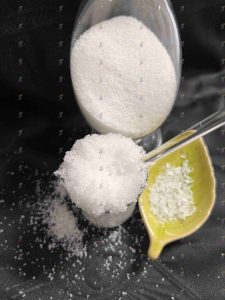Potassium polyacrylate is a type of superabsorbent polymer (SAP), an advanced physical absorbent material known for its remarkable ability to absorb and retain large quantities of water relative to its own mass. SAPs are hydrophilic homopolymers or copolymers that transform from a powder or granular state to a hydrogel state upon water absorption.
Understanding Superabsorbent Polymers (SAPs)
Superabsorbent polymers are designed to absorb and hold vast amounts of liquid, making them useful in a variety of applications. They are non-toxic, harmless, and environmentally friendly, ensuring they do not pollute the environment. Potassium polyacrylate is a specific type of SAP tailored for agricultural use as a water-retaining agent.

Unique Advantages of Agricultural-Grade SAP (Potassium Polyacrylate)
Agricultural-grade SAP, such as potassium polyacrylate, undergoes special post-processing during production, including grafting, which imparts unique benefits for agricultural use:
- Cation Modification: The polymer’s sodium ions are replaced with potassium ions. This prevents soil salinization caused by sodium and enriches the soil with beneficial potassium ions after decomposition.
- Enhanced Water Absorption: It significantly improves the absorption capacity of high-concentration ionic liquids (such as soil leachate) under soil pressure.
- Extended Decomposition Time:
- Ordinary SAP decomposes into a gel within about a month after absorbing water.
- Agricultural SAP can repeatedly absorb and release water in the soil for several months.
- Natural Degradation: After degradation, it breaks down into ammonium nitrogen, water, and a small amount of potassium ions, thus enhancing soil quality.
Agricultural-Grade SAP Benefits
Potassium polyacrylate acts like a “mini reservoir,” storing water during rainy seasons or irrigation and gradually releasing it to plants during dry periods. This brings several benefits:
- Improves Seed Germination and Emergence: Provides plants with a healthy start.
- Slow-Release Fertilizer: Gradually supplies nutrients to plants.
- Enhances Soil Water Holding Capacity: Can increase the water holding capacity of sandy soils by up to 85%, saving irrigation water.
- Increases Crop Yields: For example, melon yields in California have increased by 70% with its use.
How Agricultural-Grade SAP (Potassium Polyacrylate) Works
Agricultural-grade SAPs consist of polymeric chains linked by cross-linking agents, forming a network. When water contacts these chains, it is drawn into the molecule by osmosis and stored within the polymer network, turning the SAP powder into a water gel. This water gel’s absorption capacity is greater than that of soil but less than that of plant roots, ensuring the absorbed water is released to plants when the soil dries out.
Conclusion
Potassium polyacrylate, as an agricultural-grade superabsorbent polymer, plays a crucial role in modern agriculture by improving water retention in soil, enhancing crop yields, and providing a sustainable solution to water management in farming. Its unique properties and benefits make it an invaluable resource for farmers seeking to optimize their water usage and improve plant health.

